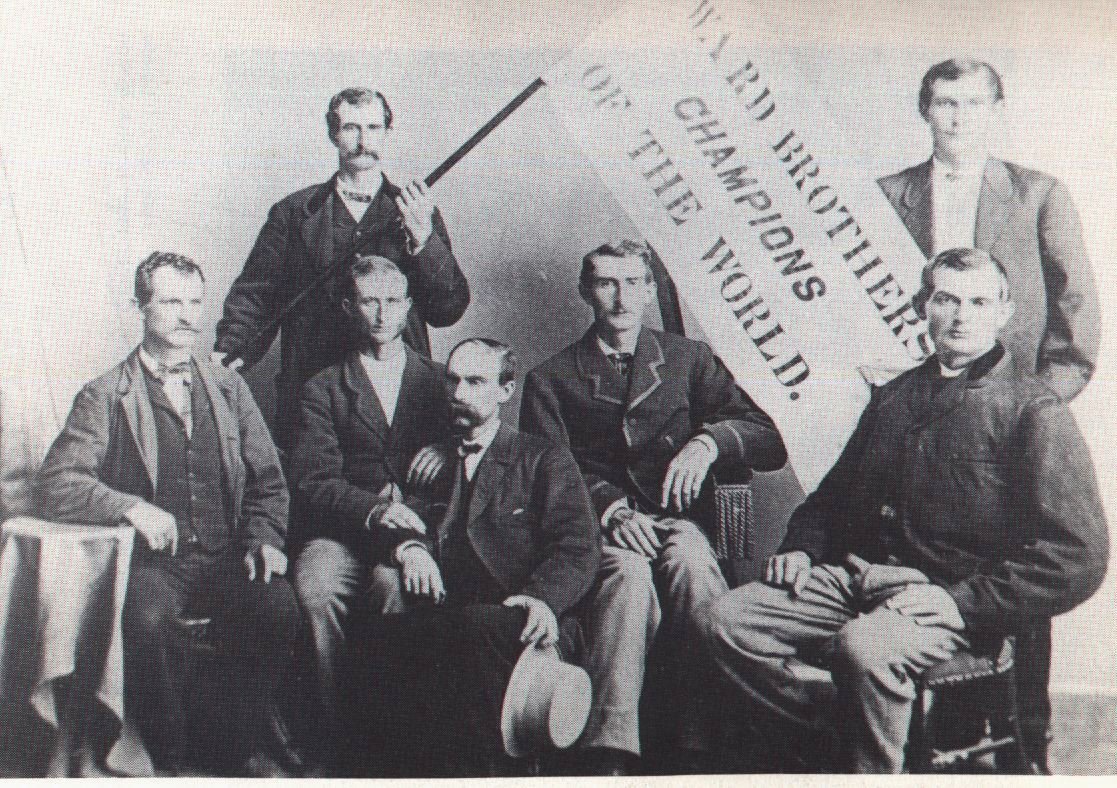
The six Ward Brothers pose, perhaps with their father, holding their world championship flag.
By Mary McTamaney
Competitive sports are gradually coming back after total shutdown during the COVID-19 epidemic. Stadiums are empty this season even with the beginning of professional games after a long hiatus. This month, the Kentucky Derby was run to empty stands around the racetrack, postponed from spring and the height of the pandemic. In baseball stadiums, lifesize cardboard paper dolls are filling some seats wearing constant photo grins despite the plays going on in front of them.
Cheering crowds do impact performance and always have. Even old engravings and paintings show people on the sidelines of sporting events rooting for their favorites. The cardboard fans on TV made me think of one 19th century cheer I have read about. It was hollered out as Newburgh’s champion rowers competed in races out on the river. The cheer was “Bully!” It does predate Teddy Roosevelt and reportedly is what could be heard from the spectators along the shore of the Hudson.
Thousands of people would come to Newburgh to watch the races among oarsmen competing singly or in pairs or teams of four as they rowed along courses set out in the Hudson with “stake boats” that marked their turning points. Newburgh Bay was a favorite race location because so many spectators could be accommodated on both shores and on steamboats and barges pulled alongside to watch. New York City papers covered the races and described “all the roofs of dwellings and storehouses covered with people as well as ships loaded to the water’s edge with spectators.” Races in those days were long and vigorous: 4 or 5 miles was a common distance compared to the 500-2,000 meter races we now see at Olympic and other trials (2,000 meters is about one and one-quarter mile.)
Most famous among the local oarsmen were the Ward brothers who were raised along the river in Middlehope. The family’s cabin where all six brothers were born was along the Roseton shoreline in a place then called by the inelegant name of Mud Hole. The boys, Benjamin, Hank, Charles, Josh, Gilbert and Ellis, learned from their fisherman father to make nets and the wooden needles that wove them and they set out at young ages to seine for shad and for sturgeon, the huge 200+ pound catch then known as “Albany beef.” They handled all types of watercraft in setting their lines and building the impound pens where they kept their catch before market. Maneuvering the heavy, broad fishing boats was perfect training for them to be ready when the sport of competitive rowing caught on in the U.S.
The Wards were ideal rowers for their era, averaging six feet in height and just 158 pounds in weight. A NY reporter described them in 1871 as having unbeatable muscular efficiency. “They are long and lean and wiry and, when trained as fine as now, they are like greyhounds. Their reach with their long gaunt bodies and arms is something wonderful.” The Ward Brothers, particularly Josh alone and Josh with Ellis, Gilbert and Hank in 4-man sculls, won many world championships between 1858 and 1871, defeating contestants from America, Canada and England. They set speed records that lasted for nearly 100 years until very lightweight and efficient racing craft could be made with modern materials and engineering.
Newburgh began sponsoring rowing regattas in 1837. They were funded by local businessmen who not only offered the prize money but paid for the building of the sculls and the outfitting of the crews, including their colorful silk team shirts. West Point sent a band to play for the event and silver belts or cups were fashioned as prizes and a great ball was held afterward at a Front Street hotel to celebrate. Charities benefited from the races as well. The 1838 regatta raised $300 for the benefit of the Newburgh Library Association.
More about the early history of crew can be found in the classic book by Gilbert Ward’s granddaughter Irene Ward Norsen: Ward Brothers, Champions of the World.